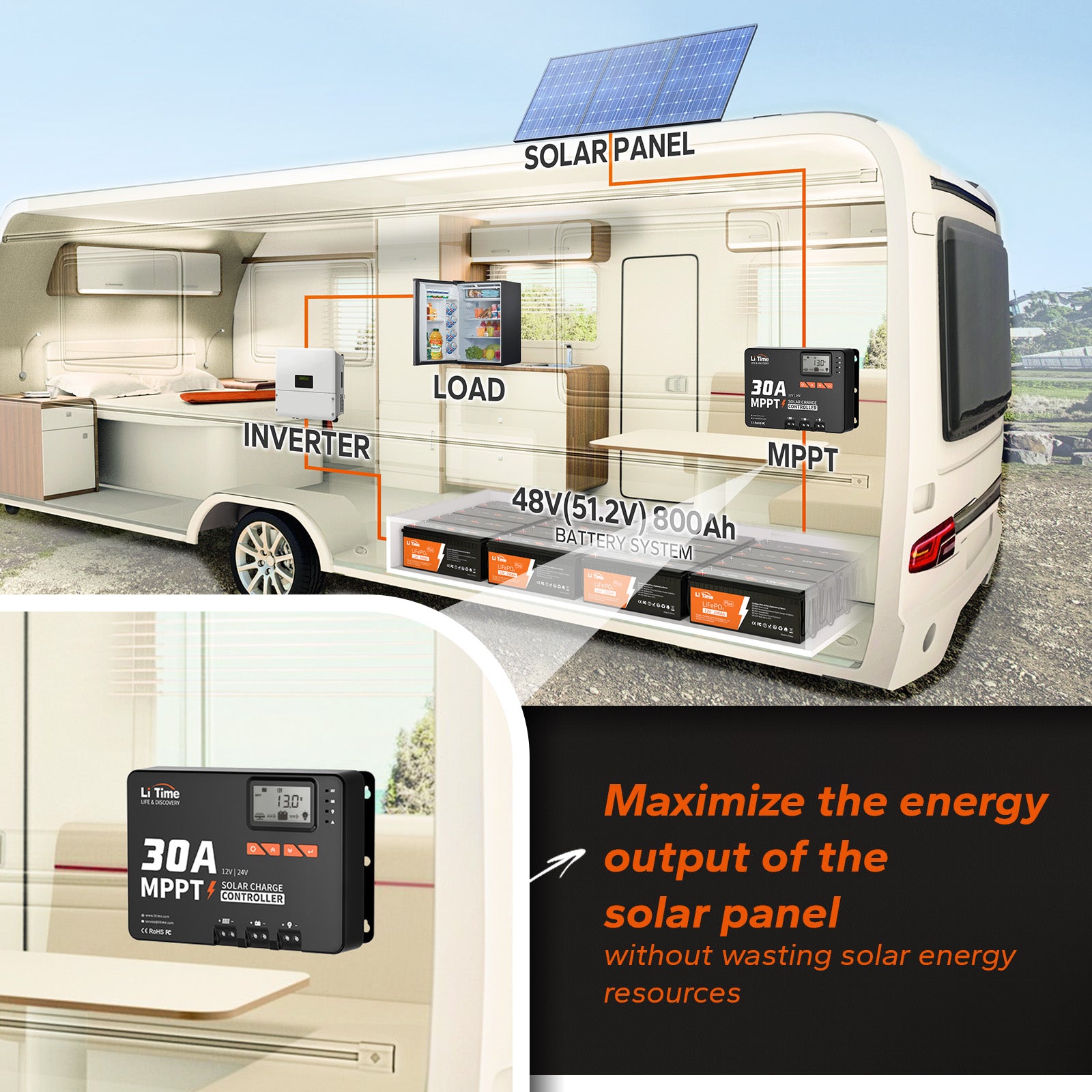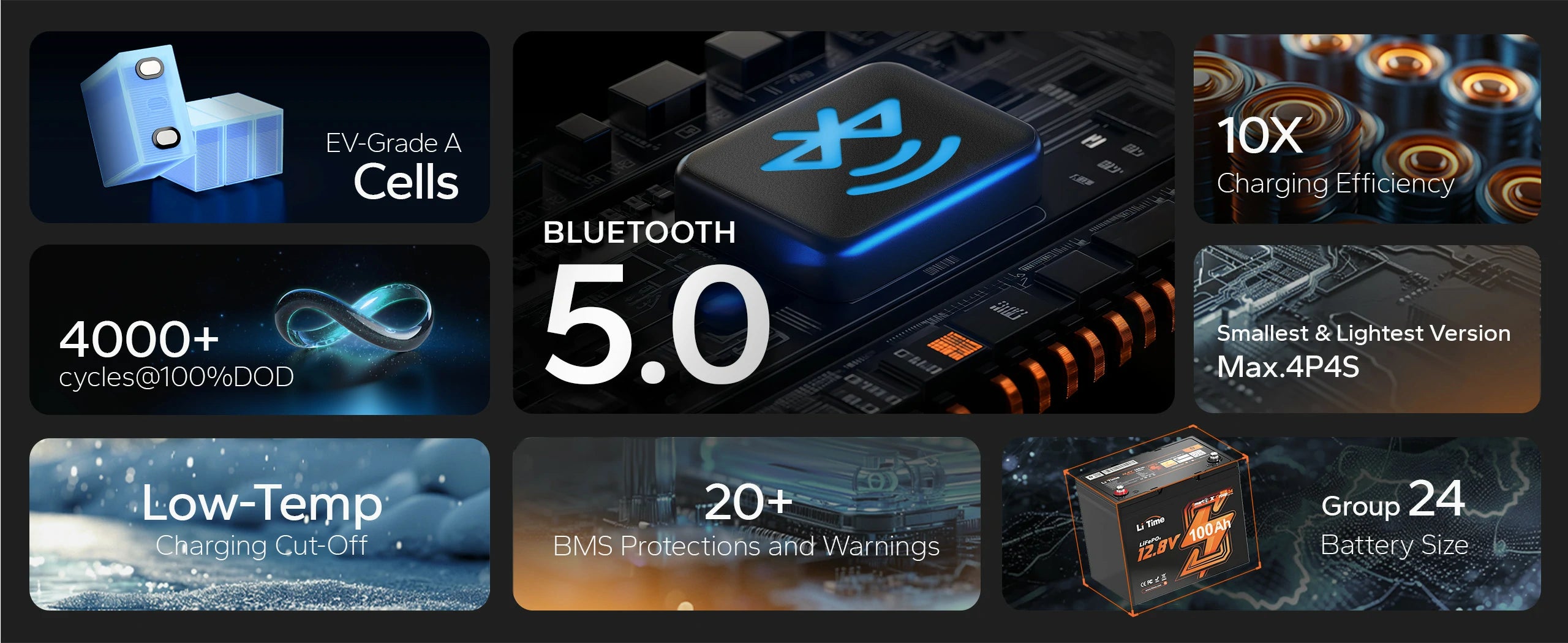Are you planning a boondocking adventure and wondering how long your RV battery will last? Boondocking, also known as dry camping, offers the thrill of off-grid living but requires careful consideration of your power supply. Your RV battery is your lifeline when you're off the grid, providing energy for lights, appliances, and electronics.
Understanding how long your RV battery will last while boondocking is essential for a successful and enjoyable trip.
What's the Ideal RV and Travel Trailer Battery for Dry Camping and Boondocking?
Camping has long been a cherished American tradition, offering an escape to the great outdoors. Imagine a leisurely weekend getaway, especially when you have the luxury of a spacious travel trailer or RV. As camping has evolved over the years, new trends such as boondocking and dry camping have emerged, adding a new dimension to the camping experience.
Dry camping simply means camping without hookups, often at an RV park with amenities like shower houses and pools. On the other hand, boondocking takes this concept a step further, involving off-grid camping without the comforts of a traditional campground. Whether it's a truck stop, a Walmart parking lot, or a serene spot in a national forest, boondocking means no electrical hookups and no readily available amenities. In this scenario, the key to a comfortable and enjoyable stay lies in a dependable and efficient RV battery setup.
Understanding the Best Batteries for Boondocking and Dry Camping
For families or couples seeking to bond in the tranquility of nature, proper planning and execution are essential. This is why boondockers and dry campers equip their travel trailers or RVs with reliable batteries. To determine the best RV battery for your specific needs, it's important to start with a basic understanding of your systems.
Your RV is Powered by Two Main Systems
1. 120-Volt AC System: This system powers luxury items such as the refrigerator, microwave, and air conditioning. Typically, it draws electricity from shore power or a generator and charges the battery bank when plugged in. However, for boondocking and dry camping, shore power is not an option, so alternative power sources like generators or solar panels are used.
2. 12-Volt Deep Cycle Battery: Often known as the "house battery", "leisure battery" or "service battery", this is responsible for powering essentials such as lighting, the water system, and overhead fans. In the context of boondocking and dry camping, this battery can serve as your sole power source. However, when disconnected from all power sources, its charge will only last for a limited time.
Selecting the Right 12-Volt Deep Cycle Battery
When it comes to off-grid camping, choosing the right 12-volt deep cycle battery is crucial. This battery is essential for pumping water throughout your trailer, providing illumination, and powering safety devices, among other functions. Without a reliable and long-lasting 12-volt DC battery, your adventure could be cut short.
In essence, besides a comfortable bed and freedom from mosquitoes, a dependable house battery is what distinguishes boondocking from simply sleeping in a tent. A trusted 12-volt house battery is an indispensable component of any successful boondocking or dry camping adventure.
Many individuals who engage in boondocking and dry camping opt to utilize two 12-volt batteries. In general, this setup provides sufficient power to maintain lighting during the night, operate vent fans throughout the day, charge electronic devices, utilize the water pump, and even run a propane furnace throughout the night. Doubling the power is achievable by employing lithium (LiFePO4) RV batteries because of its 100% DOD while traditional lead-acid batteries only has 50% DOD.
Typically, depending on your power usage, boondocking can be sustained for a period ranging from 2 to 7 days. However, the duration largely hinges on the type of batteries you employ. Inefficient batteries with limited charge-holding capacity can significantly curtail your trip. Therefore, it is crucial to select the most suitable battery to meet your specific requirements. Here’s an example:
|
Equipment (Typical example) |
Current (Amps) |
Multiply by |
Hours of use |
= |
Amp hour rating (AH) |
|
One fluorescent tube |
0.75 |
x |
5 |
= |
3.75 |
|
2 halogen lights |
1.50 |
x |
3 |
= |
4.50 |
|
LCD TV |
2.5 |
x |
4 |
= |
10.00 |
|
TV booster |
0.05 |
x |
4 |
= |
0.20 |
|
Water pump |
0.7 |
x |
0.5 |
= |
0.35 |
|
Motor mover |
30 (Average) |
x |
0.3 |
= |
9.00 |
Sub Total | = | 27.8 (For winter use, add an extra 10%)
Add 20% safety margin | = | 5.56
Total Ampere Hours required per day | = | 33.36
So if you have a 100ah battery, it would last 3-4 days.
How Do You Charge RV Batteries?
There are two methods to charge your RV batteries while boondocking. First, you can use a DC to DC charger. It should be of high quality and deliver at least a 40-amp charge rate. When you run your generator for an hour, the DC-DC charger will deliver 40 amps of power to your RV battery.

The second method involves permanently installing an MPPT (Maximum Power Point Tracking) solar charge controller for solar panels. This type of charger will provide better performance, maximizing the power output from your solar panels.

Related reading: Solar Charge Controller Sizing And How To Choose
Do RV Batteries Charge While Driving?
While RV batteries can charge while you drive, the charging process can be relatively slow. Typically, the vehicle's alternator is responsible for charging the batteries while the engine is running. However, the charging rate is limited by the output of the alternator, which is primarily designed to power the vehicle's electrical systems and charge the starting battery.
The charging rate while driving is influenced by several factors, including the alternator's capacity, the state of charge of the batteries, and the electrical load on the vehicle. As a result, the alternator usually provides a trickle charge to the RV house batteries, leading to a slower charging process.
For faster and more consistent charging, especially when the batteries are deeply discharged or when additional power needs arise, using a dedicated battery charger or installing solar panels with a solar charge controller can provide a more efficient charging solution for RV house batteries.
Best RV & Travel Trailer Battery For Dry Camping & Boondocking: Lead-Acid VS Lithium
If you fall into the category of an occasional camper, where your battery usage is infrequent (perhaps every few years), opting for the least expensive option, such as lead-acid RV batteries, might be suitable.
However, for the majority of campers seeking durability and value, lithium iron phosphate (LiFePO4) batteries offer a safer and longer-lasting solution. For most people, choosing lithium batteries is the superior choice, as it helps prevent battery-related issues during your outdoor excursions, allowing for a more enjoyable experience.
While this provides a general overview, delving into the specifics will aid in determining the most suitable battery for your boondocking adventure and the reasons behind it.
Enhanced Energy Density
Lithium batteries boast a superior energy density, allowing them to store more energy within a smaller and lighter framework. This attribute proves particularly advantageous in recreational settings where space and weight are critical factors.
Extended Lifespan
In contrast to lead-acid batteries, lithium batteries typically offer a prolonged lifespan. They can withstand a greater number of charge-discharge cycles, resulting in an overall longer operational life. For example, LiTime lithium batteries exhibit a life cycle of 4000-15000, capable of serving for more than 10 years.
Rapid Charging Capability
Lithium batteries can be charged at a considerably faster rate compared to lead-acid batteries. This feature is especially advantageous for individuals reliant on swift recharging during their recreational pursuits. Suggest reading: Charging Speed of Lithium Batteries: Low Speed VS Fast Charging
Reduced Weight
Lithium batteries are notably lighter than lead-acid batteries, simplifying handling and decreasing the overall weight of vehicles or equipment.
Low Maintenance
Lithium batteries demand minimal maintenance in comparison to lead-acid batteries, which often necessitate regular checks and upkeep to ensure optimal performance.
Stable Voltage Output
Throughout the discharge cycle, lithium batteries provide a more consistent voltage, which proves beneficial for powering sensitive electronics and appliances.
Built-in Safety Features
Lithium batteries are equipped with a built-in battery management system designed to safeguard against over-charging, over-discharging, overcurrent, short circuits, high temperatures, or even low temperatures.

Bluetooth Function to Track the Battery Statement
This feature represents one of the most thrilling aspects of lithium batteries. Utilizing Bluetooth technology that syncs with your smartphone, you can accurately monitor the remaining battery power, ensuring no uncertain situations or disrupted boondocking experiences.
Here we must recommend LiTime 12V 100Ah Group 24 Smart Lithium Battery, which is equipped with Smart Bluetooth 5.0.
By using the LiTime APP, you can seamlessly monitor the battery's real-time status and data, including state of charge (SOC), charge/discharge/idle status, battery voltage, current, power, remaining capacity, battery temperature, and life cycles. The battery barcode can be scanned for automatic connection, allowing control over discharge and power-off functions. Confused about What are the Differences Between Group 24 VS Group 31? Click to know.

Equipped with an advanced 100A Battery Management System (BMS), this battery offers 20+ protections and warnings, notably including smart Bluetooth capability, low-temperature charging cut-off protection, over-voltage protection, low-voltage protection, over-current protection with auto recovery, over-temperature protection, low-temperature protection, short-circuit protection, overload protection, and pre-charging function with a 30mF capacitive load. These features ensure stable, intelligent, and safe operation.

Tips for Extending RV Battery Life
Energy-Efficient Appliances: Opt for energy-efficient appliances and lighting to reduce power consumption.
LED Lighting: Replace traditional bulbs with LED lights, which consume less energy and can significantly extend battery life.
Battery Monitoring System: Install a battery monitoring system to track energy usage and remaining capacity accurately.
Solar Power: Investing in solar panels can help recharge your RV battery during the day, reducing reliance on other charging sources.
Battery Maintenance: Regularly maintain your RV battery by keeping it clean, checking connections, and ensuring proper ventilation.
Hope this article can help you! Can also learn more about how to store lithium batteries and how to charge lithium batteries.








